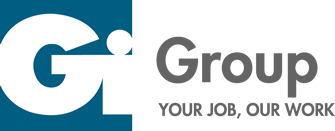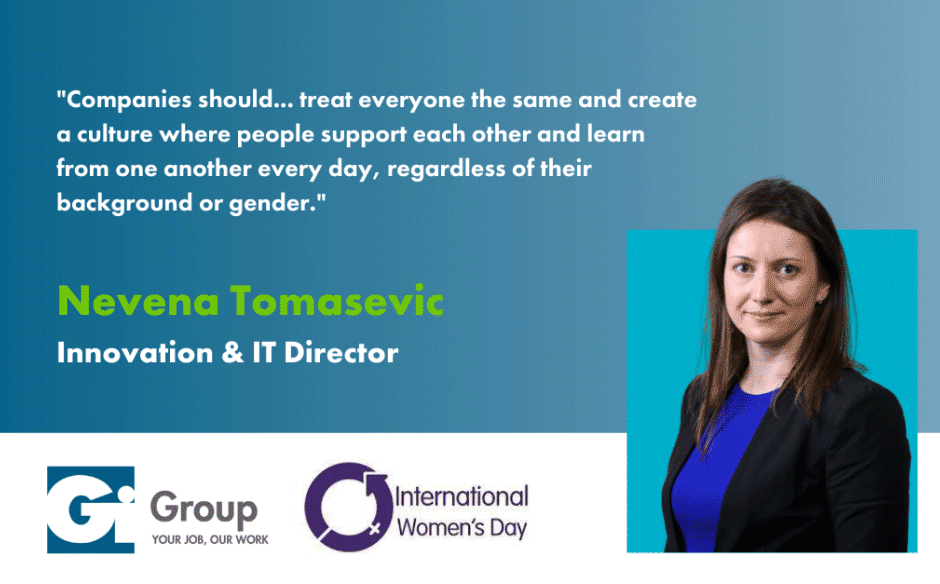- Tell us a little bit about yourself, your role and how you got there?
I am Nevena, which means Marigold in Serbian! I am originally from Serbia but moved to London in 2004 to finish my degree. After graduating, I joined the London School of Economics (LSE) as a temp. 10 years and 7 roles later, I was approached to join Gi Group as a Global Innovation & Change Manager, reporting to the Global CIO.
Although my background is in international business, I quickly found myself involved in reviewing processes and using available and new technologies to re-engineer processes and drive positive transformation and change. Recognising that IT was becoming a big part of my working life, I embarked on a two-year part-time MSc in Computing. This was one of the most intense two years of my life – working full-time and studying part-time was no mean feat.
Today I am the Innovation & IT Director at Gi Group. I believe a positive attitude has played a key role in helping me to develop my career, along with a huge appetite for learning and a natural inquisitiveness. However, being open to feedback in order to constantly improve, knowing when to sit back and listen and when to take action and stand up for myself and my teams have also contributed to my career success.
- Did you encounter any biases in your career as a result of your gender?
My experiences with biases really vary. Being the youngest of three and growing up with two older brothers (and a very strict, patriarchal father) allowed me to learn very quickly that I had to stand up for myself. There was often an attempt to exclude me from activities because they were meant just for boys and I felt like I had to ask why and challenge this at pretty much every step of my early life. At the same time, my brothers treated me like one of them and I always felt like I had their love and protection, which enabled me to confidently stand up to injustice and biases from an early age and to become independent.
Travelling during high school, and later on, when I moved to the UK, I encountered biases a few times – being from Serbia, being a woman and looking younger than my years to name a few. When I first became a manager, I was one of the youngest and the only foreign female manager in the division I worked in. Working in IT/Technology and Process Improvement often meant that I found myself in meetings with managers and directors who were mainly men, much older than me and who assumed that I was there to take minutes…they quickly learned that that wasn’t part of my role!
- How did you motivate yourself to keep going in the face of these challenges?
I always keep myself motivated through learning, by being honest, transparent and courageous to ask questions, even if I am worried I may sound stupid. I also believe in letting my work speak for itself. Demonstrating your abilities is the best way to challenge biases in my experience.
- What advice would you give to other female talent looking to succeed in a role/career like yours?
Listen carefully, do your homework and be respectful of other people’s experiences and beliefs (don’t be biased yourself!) Learn quickly and be courageous to stand up for yourself patiently and respectfully. Be authentic.
- What advice would you give to companies to help them create an environment where women can thrive?
Treat everyone the same and create a culture where people support each other and learn from one another every day, regardless of their background or gender. Re-frame people’s opinions through training, coaching, mentoring and sharing.
- How has your organisation helped you to flourish in your career?
I have been lucky enough to have had both male and female managers who have supported me in developing my career. Whether this has been pushing me when I had outgrown my role, creating opportunities or providing feedback for me to further learn and grow. Importantly, all my managers have understood that autonomy is a key driver for me and have provided this.
- With news that the number of women in FTSE 100 boardroom roles has jumped to 39.1% from 12.5% 10 years ago, how do you envision the future world of work for women?
It’s great to see that things are moving in this direction, however I am not as excited about numbers as I am about women being given an opportunity to share their expertise, point of view and for their voices to be heard.
- What do you think male colleagues can do to help eliminate gender bias and support women in the workplace?
I don’t think it is a question of what male or female colleagues can do to eliminate gender bias. For me this starts with the organisation and the culture it fosters. Organisations should treat everyone equally, regardless of gender. Respect has to be a core pillar, as does meritocracy. However, organisations also have to empower employees to speak out, without prejudice, if they do encounter any gender bias or discrimination.
- What advice would you give your younger self, or another woman at the start of her career journey?
Listen, be patient, learn and accept constructive criticism. Stick to your knowledge and experience and don’t be afraid to speak up when you know that you will bring value to a conversation. You have to be heard to be seen.
- Do you believe we will reach true gender parity in our lifetime?
This is a difficult question, and coming from a different country I recognise the challenges we face globally. I think in larger economies where women have had an active presence for many years, we will. For other countries, I think it will take more time. However, that just means we need to make sure that we do more to pave the way and make the journey easier for others.
- What 3 words would you use to describe female leaders in your organisation or industry?
Smart, capable, honest.











